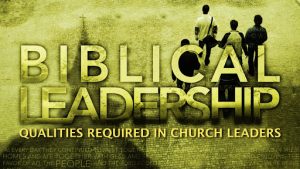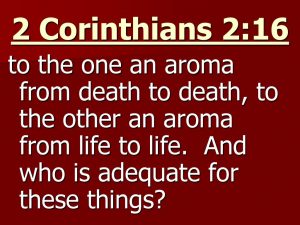
 Last week we spent our time together looking at, as part of the make-up of a church, the structure and character of its leadership. We saw that leadership of the church has been entrusted by God to godly men, called by His Spirit to the unique and difficult task of shepherding God’s flock, the church. These men were referred to as elders, shepherds, or overseers, depending upon the traits being emphasized. We saw that these men were always appointed in plurality…that is, there was always more than one man entrusted with leadership and that these men were commissioned to work in harmony and humility together to provide direction, edification, correction, and protection to the local church of which they were a part. We saw that these men were to embark on the task of leadership with eagerness, recognizing their calling by God and in abiding and sacrificial love for their people. And we saw that they were to be men of a certain character, living up to their high calling and equipped for their tasks and responsibilities. It is to these qualifications that we now turn.
Last week we spent our time together looking at, as part of the make-up of a church, the structure and character of its leadership. We saw that leadership of the church has been entrusted by God to godly men, called by His Spirit to the unique and difficult task of shepherding God’s flock, the church. These men were referred to as elders, shepherds, or overseers, depending upon the traits being emphasized. We saw that these men were always appointed in plurality…that is, there was always more than one man entrusted with leadership and that these men were commissioned to work in harmony and humility together to provide direction, edification, correction, and protection to the local church of which they were a part. We saw that these men were to embark on the task of leadership with eagerness, recognizing their calling by God and in abiding and sacrificial love for their people. And we saw that they were to be men of a certain character, living up to their high calling and equipped for their tasks and responsibilities. It is to these qualifications that we now turn.
As we saw last week, the qualifications for eldership are found predominately in two sections of scripture… 1 Tim 3 and Titus 1. They are both written to Paul’s coworkers who have been left to watch over their churches in Paul’s absence. In 1 Tim 3:1ff we read, “It is a trustworthy statement: if any man aspires to the office of overseer, it is a fine work he desires to do. 2 An overseer, then, must be above reproach, the husband of one wife, temperate, prudent, respectable, hospitable, able to teach, 3 not addicted to wine or pugnacious, but gentle, peaceable, free from the love of money. 4 He must be one who manages his own household well, keeping his children under control with all dignity 5 (but if a man does not know how to manage his own household, how will he take care of the church of God?), 6 and not a new convert, so that he will not become conceited and fall into the condemnation incurred by the devil. 7 And he must have a good reputation with those outside the church, so that he will not fall into reproach and the snare of the devil.” And Titus 1:1ff reads similarly, , “For this reason I left you in Crete, that you would set in order what remains and appoint elders in every city as I directed you, 6 namely, if any man is above reproach, the husband of one wife, having children who believe, not accused of dissipation or rebellion. 7 For the overseer must be above reproach as God’s steward, not self-willed, not quick-tempered, not addicted to wine, not pugnacious, not fond of sordid gain, 8 but hospitable, loving what is good, sensible, just, devout, self-controlled, 9 holding fast the faithful word which is in accordance with the teaching, so that he will be able both to exhort in sound doctrine and to refute those who contradict.”
 Both lists, then start out with a qualification that encompasses all the others that follow…an overseer…an elder…must be “above reproach”. But what does “above reproach” mean? Though Paul uses different words in these two passages, they have fundamentally the same meaning. To be “above reproach” is to be un-accusable…that no criticism or blame can be held against him. But this must be too broad a definition. After all, we are all “accusable” in some way. For example, I could be legitimately accused of lacking fashion sense… or not eating healthily… or not keeping my car clean. It is important to understand that “above reproach” is not a catch all category to which we can assign any of our “pet sins”. For example, some say that an elder cannot dance or play cards, because those things, for some, are “reproachable”…things that they deem unacceptable. The same could be said for dress, saying that an overseer must wear a suit and tie in the assembly or present a proper image. In doing so, they make “above reproach” into a tyrannical standard wielded by anyone that wants to add additional unbiblical criteria.
Both lists, then start out with a qualification that encompasses all the others that follow…an overseer…an elder…must be “above reproach”. But what does “above reproach” mean? Though Paul uses different words in these two passages, they have fundamentally the same meaning. To be “above reproach” is to be un-accusable…that no criticism or blame can be held against him. But this must be too broad a definition. After all, we are all “accusable” in some way. For example, I could be legitimately accused of lacking fashion sense… or not eating healthily… or not keeping my car clean. It is important to understand that “above reproach” is not a catch all category to which we can assign any of our “pet sins”. For example, some say that an elder cannot dance or play cards, because those things, for some, are “reproachable”…things that they deem unacceptable. The same could be said for dress, saying that an overseer must wear a suit and tie in the assembly or present a proper image. In doing so, they make “above reproach” into a tyrannical standard wielded by anyone that wants to add additional unbiblical criteria.
In the same manner, it cannot be a demand for sinless perfection, because that is unobtainable in this world. We can all find reasons for reproach when we look into the murkiness of our own hearts. We can see the “sin that so easily besets us” and the weaknesses of which we are painfully aware. Peter exhibited moments of weakness and hypocrisy before the gentile believers in Antioch. (Gal 2:11ff). Timothy suffered at times from a lack of confidence and boldness. (2Tim 1:6ff.)
The only way we can properly understand the qualification of being “beyond reproach” is in the context of the qualifications that follow it. Because of the nature of the term and its place at the beginning of the list of qualifications in both places, “beyond reproach” serves as the heading for all that follows. It is not one qualification in a list of qualifications but is an overall statement of qualification that contains all those that follow. So one is “beyond reproach” by exhibiting and striving after all the things that Paul lists as qualifications for elders. In Paul’s letter to Timothy, these qualifications can be organized into four categories…character (containing the majority of the qualification and found in vs.2-3), household management ( vs 4-5), maturity of faith (vs 6), and reputation (vs 7)
 So, the first specific qualification for eldership is that he be, literally, a “one woman man” or “husband of one wife”. It is best understood, not as a state or condition of matrimony, but an inclination of heart. It is not likely a prohibition against polygamy… having more than wife… as polygamy was not commonly practiced in Greek or Roman society nor accepted in the church. Nor is it likely that it specifically addresses divorce and remarriage or remarriage after the death of a spouse. While divorce is discouraged in God’s Word, allowance is made for remarriage in certain circumstances without criticism or censure. And we find no prohibition or criticism of remarriage for widows or widowers, so it can’t really be seen as a prohibition based upon having been married more than once. Finally, it is cannot be saying that no unmarried men can be elders. This would eliminate Paul from qualification as he was unmarried (1 Cor 7:8), yet he clearly identifies himself as an elder in his letters to Timothy where he includes himself as one of the elders who laid hands on him to affirm his calling and giftedness. It also would provide an unacceptable contrast to Paul’s affirmation of singleness as an acceptable and high calling. The very reasons given for singleness in 1 Cor 7:32-35 are to more devoted to God… qualities that would typically make for a great elder.
So, the first specific qualification for eldership is that he be, literally, a “one woman man” or “husband of one wife”. It is best understood, not as a state or condition of matrimony, but an inclination of heart. It is not likely a prohibition against polygamy… having more than wife… as polygamy was not commonly practiced in Greek or Roman society nor accepted in the church. Nor is it likely that it specifically addresses divorce and remarriage or remarriage after the death of a spouse. While divorce is discouraged in God’s Word, allowance is made for remarriage in certain circumstances without criticism or censure. And we find no prohibition or criticism of remarriage for widows or widowers, so it can’t really be seen as a prohibition based upon having been married more than once. Finally, it is cannot be saying that no unmarried men can be elders. This would eliminate Paul from qualification as he was unmarried (1 Cor 7:8), yet he clearly identifies himself as an elder in his letters to Timothy where he includes himself as one of the elders who laid hands on him to affirm his calling and giftedness. It also would provide an unacceptable contrast to Paul’s affirmation of singleness as an acceptable and high calling. The very reasons given for singleness in 1 Cor 7:32-35 are to more devoted to God… qualities that would typically make for a great elder.
Rather, this is best understood as a statement of love and fidelity… having a heart wholly focused on one’s marriage and spouse. It would prevent adultery and, for the unmarried, promote chastity. It preserves and strengthens love and speaks of a husband loving his wife well…as Christ loves the church. It reflects the heart of the bridegroom entwined with the heart of his betrothed, as we see in Song of Solomon. It speaks of the devotion, satisfaction and joy expressed and enjoined in Prov 5:15-20. In comparing the loving communion between husband and wife with the refreshment of cool water, we read, “Drink water from your own cistern and fresh water from your own well. 16 Should your springs be dispersed abroad, Streams of water in the streets? 17 Let them be yours alone and not for strangers with you. 18 Let your fountain be blessed, and rejoice in the wife of your youth. 19 As a loving hind and a graceful doe, Let her breasts satisfy you at all times; Be exhilarated always with her love. 20 For why should you, my son, be exhilarated with an adulteress and embrace the bosom of a foreigner?” This is to be the heart of the elder or prospective elder toward his wife…intimate, desirous, gracious, and enduring.
It is worthwhile to note that being a “one woman man” heads the list of qualifications in both of Paul’s letters, and I doubt that is by accident. I believe it is foremost on the list because it is a sin that so easily besets men… especially men of position and influence, with devastating personal and congregational consequences. As mentioned in earlier studies, we live in a “sex-saturated” society, where infidelity and adultery are promoted as normal and desirable activities. Illicit sexual activity among men of power and influence is taken as a matter of course, barely noteworthy in its commonness. Even in organizations and churches proclaiming Christ as Lord, sexual immorality is all too commonplace. We routinely hear stories of church leaders accused of, or admitting to, sexually inappropriate behavior. And we see the devastating consequences of their behavior in the lives of those who trusted and followed them… shattered faith…surrendered battles… separated families… and splintered institutions. Paul warns us to guard against this by ensuring our leaders are “one-woman” men who love and cleave to their wives and flee sexual temptation.
 The next qualification we find in Tim 3 is “temperate”…in the Greek, nēphalios. It is substantially synonymous with the qualification that follows it, “prudent”, or sōphrōn. . So close are these two terms that Paul, in writing similar instructions to Titus, uses only the latter term, sōphrōn to communicate this concept. The idea here is that the man entrusted with the leadership of the church…responsible for discerning and implementing the will of the Spirit…is to be watchful and sober. It speaks to a certain carefulness of thought and action. It is someone who does not cloud his mind with either excessive drink or desire, but remains in control. It is a man who is disciplined and can follow through on his plans and intent. Obviously, this is an important characteristic for a leader of the church to possess. He would be a poor example to the flock if he were a man scattered in his thinking and undisciplined in his behavior. The elder is to somebody one can depend on, knowing that he can be trusted to accomplish his responsibilities with diligence and good result. He is not easily distracted or drawn toward vain speculations or worldly pursuits. He remains focused on the things that matter in the kingdom of God.
The next qualification we find in Tim 3 is “temperate”…in the Greek, nēphalios. It is substantially synonymous with the qualification that follows it, “prudent”, or sōphrōn. . So close are these two terms that Paul, in writing similar instructions to Titus, uses only the latter term, sōphrōn to communicate this concept. The idea here is that the man entrusted with the leadership of the church…responsible for discerning and implementing the will of the Spirit…is to be watchful and sober. It speaks to a certain carefulness of thought and action. It is someone who does not cloud his mind with either excessive drink or desire, but remains in control. It is a man who is disciplined and can follow through on his plans and intent. Obviously, this is an important characteristic for a leader of the church to possess. He would be a poor example to the flock if he were a man scattered in his thinking and undisciplined in his behavior. The elder is to somebody one can depend on, knowing that he can be trusted to accomplish his responsibilities with diligence and good result. He is not easily distracted or drawn toward vain speculations or worldly pursuits. He remains focused on the things that matter in the kingdom of God.
The next qualification we find in Paul’s letter to Timothy is one that naturally flows out of the two preceding qualifications… temperate and prudent. The term used is “respectable” in most translations and is derived from the word kosmos, or “world”. It speaks of things being “in order”…appropriate. A man who is temperate and prudent has his world in order. His words are appropriate to the conversation in which he is engaged. His behavior is appropriate to the circumstance and situation he is in. His appearance is appropriate to the event being attended. The only other place that this term is used is earlier in Paul’s letter where he is giving instruction on proper adornment. In 1 Tim 2:9 Paul writes, “I want women to adorn themselves with proper clothing, modestly and discreetly, not with braided hair and gold or pearls or costly garments, 10 but rather by means of good works, as is proper for women making a claim to godliness.” The behavior of an elder is not to be showy or ostentatious. His world is not to be unbalanced or out of control. Rather, his life is to exhibit a godly order and understanding. He views himself, his world, and his God, rightly.
 Beloved, we have come to a good place to close our study for this evening. We are barely into the qualities that must be possessed by those God calls to lead His church, and we already see the high standard that is being set. But could it be anything else? Only men with a high view of God and a deep commitment to His purpose and kingdom can be entrusted with such the awesome responsibility of shepherding the flock of God. The writer of Hebrews makes it clear that elders will be required to give an account of how they fulfilled their responsibilities as shepherds and overseers of God’s elect. We read in Heb 13:17, “Obey your leaders and submit to them, for they keep watch over your souls as those who will give an account.” As I read these words, it brings to mind the words of Paul to the Corinthian church, “Who is adequate for these things?” Yet the call to eldership is a special calling of God and a thing to be desired.
Beloved, we have come to a good place to close our study for this evening. We are barely into the qualities that must be possessed by those God calls to lead His church, and we already see the high standard that is being set. But could it be anything else? Only men with a high view of God and a deep commitment to His purpose and kingdom can be entrusted with such the awesome responsibility of shepherding the flock of God. The writer of Hebrews makes it clear that elders will be required to give an account of how they fulfilled their responsibilities as shepherds and overseers of God’s elect. We read in Heb 13:17, “Obey your leaders and submit to them, for they keep watch over your souls as those who will give an account.” As I read these words, it brings to mind the words of Paul to the Corinthian church, “Who is adequate for these things?” Yet the call to eldership is a special calling of God and a thing to be desired.
Beloved, pray for those called to leadership among you. Commit yourself to their well being and spiritual growth and take opportunity to encourage and exhort them. And prayerfully consider your place in the eternal kingdom that God is building in the world. We are all called to “the stature of the fullness of Christ” and to exercise our giftedness on behalf of His Church, the world in which we live, and our Lord who redeemed us with His blood.
Let us pray.

0 Comments